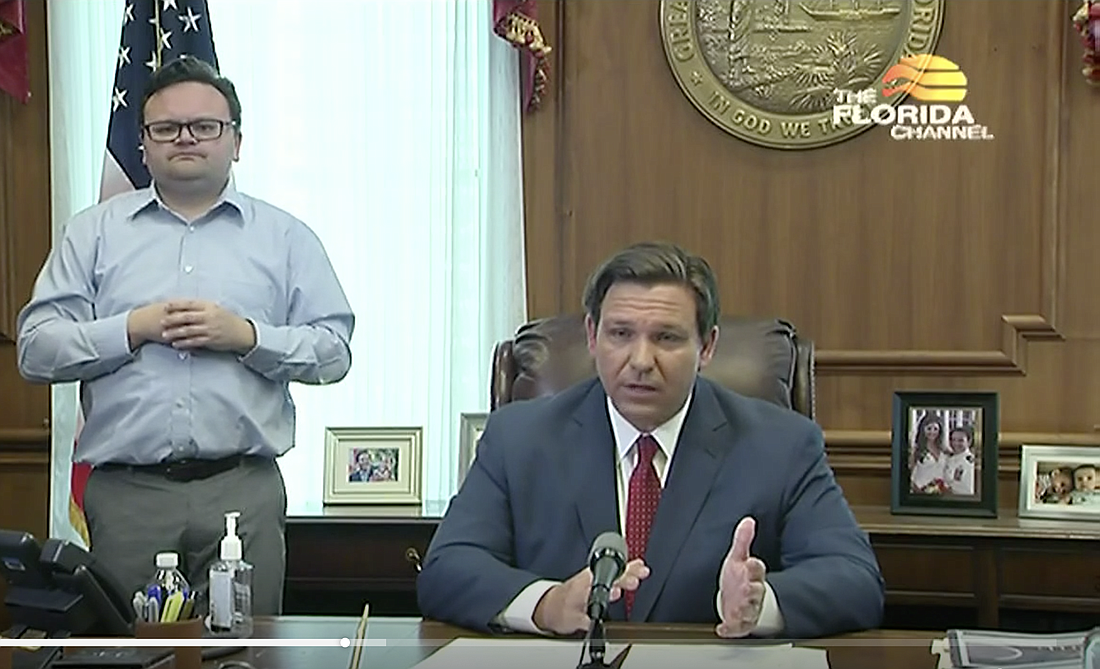- January 20, 2025
-
-
Loading

Loading

Florida Gov. Ron DeSantis issued a stay-at-home order for the entire state of Florida on April 1, ordering residents to "limit their movements and personal interactions outside of their home to only those necessary to obtain or provide essential services or conduct essential activities." The order takes effect at 12:01 a.m. Friday, April 3.
"At this point, I think even though there's a lot of places in Florida that have very low infection rates, it makes sense to make this move now," DeSantis said in a press conference broadcast on The Florida Channel on April 1. "I did consult with folks in the White House; I did speak with the president about it. He agreed with the approach of focusing on the hot spots, but at the same time he understood that this is another 30-day situation, and you've got to just do what makes the most sense."
"The government can't hamfist everybody into their bedroom; it's just not practicable. But I think that these policies are policies that will make sense."
— RON DeSANTIS, Florida governor
The order states, "A social gathering in a public space is not an essential activity. Local jurisdictions shall ensure that groups of people greater than ten are not permitted to congregate in any public space."
"Essential services," according to the executive order, include the list of industries published in the U.S. Department of Homeland Security in its Guidance on the Essential Critical Infrastructure Workforce, HERE; and businesses and activities designated by a list propounded by Miami-Dade County in multiple orders. A list of essential services is available HERE.
"Essential services" also, according to the text of the executive order, includes attending religious services, taking care of pets, caring for or otherwise assisting a loved one or friend, and participating in recreational activities such as walking, biking, hiking, fishing, hunting, running, or swimming, as long as those activities are consistent with social distancing guidelines.
The order encourages people to work from home if they can, and encourages businesses to provide delivery, carry-out or curbside service for orders placed online or by telephone, when possible.
It also directs people 65 and older with major underlying medical conditions to stay at home and "take all measures" to limit their risk of exposure to the virus.
DeSantis said he'd decided to issue the order after President Donald Trump extended social distancing guidelines through April 30.
"I think that's a signal from the president that, look, this is what we're going to be fighting for a month," DeSantis said. "There's not going to be any kind of return to normalcy; people thought Easter, all that — that's not going to happen."
DeSantis noted that because people are staying home, there's less traffic on the roads — and a chance to work on the state's infrastructure.
"You look at some of the most busy thoroughfares, and sometimes it's a trickle," he said. "I think that there's an opportunity to take advantage of that."
He said he's told the state's secretary of transportation to accelerate $2.1 billion in transportation projects, as the lower traffic volume will make it easier to close lanes and redirect vehicles without causing major traffic snags.
"It's sad that we're in this situation, but I'm glad we're able to make the most of it," DeSantis said.
Florida has conducted about 63,000 to 64,000 tests for COVID-19, and has surged resources in South Florida, DeSantis said.
The state has also ordered thousands of rapid-response tests.
"At this point, all the mitigation that we could do is done," he said. "There's parts of the state where that's going to be tough medicine, but it's uniform; it's done. And now I think the testing — and really embracing as much as we can there —is going to help provide us the information that we need to be able to make good decisions, not only about how to fight the virus, but how we can eventually get people back to work."
Getting masks from the federal government for health care workers has been difficult, he said.
"This has been one of the things we've fought more than anything on," DeSantis said. "We have received some masks from HHS, but most of the masks we get — we order so many of them, then we'll get a little bit here, a little bit there, and they just kind of trickle in."
But he was optimistic about ultimately getting the state "back on its feet."
"A week or two ago, people were talking about being in lockdown for seven, eight, nine months; that is not sustainable for the society. That won't work," he said.
But new tests, he noted, seem to come out almost daily.
"I think harnessing that technology, you're going to be able to have a society that protects against the virus but is going to allow people to do more than just work at home," he said. "And so, we're in a much better spot today on that than we were just a week ago."